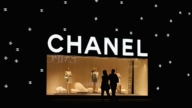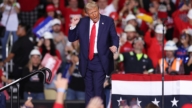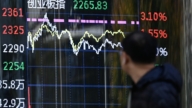【新唐人2013年09月12日訊】目前,中國大陸掀起一股海外購物潮。《華爾街日報》9月4號在報導中指出,大陸目前很多商品的價格遠超其他國家,已經造成了越來越多的大陸消費者抵制購買。專家認為,造成這種價格差異的原因,除了大陸的高關稅以及畸形的貿易政策之外,與大陸持續飛漲的物價也有很大關係。
近年來,大陸物價漫天飛漲,從「蒜你狠」、「油你漲」、「糖高宗」、「逗你玩」、「薑你軍」,到「油不得」、「豬堅強」、「萍甚麼」等反應物價飆漲的新詞迭出,百姓倍感生活艱難,深圳甚至出現了大量「港人迴流」的現象,原因是深圳的物價竟比香港還要貴三成,令定居深圳的港人不堪負重。
中國經濟學家左曉蕾曾寫過一篇文章,題目叫《中國和泰國物價之比讓人困惑》,她發現,中國一般消費品價格比泰國平均高出30%—40%。而法國等西方國家的商品價格也與泰國情況相同,比中國的價格便宜。
《華爾街日報》舉例說,中國大陸消費者要花比美國人多近1美元,才能買到1杯星巴克拿鐵。而「凱迪拉克」雷德6.0混合動力標準款汽車,在大陸要價22.9萬美元,美國則僅售7.3萬美元出頭。一臺iPad2基本款在大陸的售價是488美元,而在美國的價格是399美元。此外,大陸衣服和其他服飾售價,平均比美國貴70%。
美國「南卡羅萊納大學」艾肯商學院教授謝田:「從中國到美國來的旅遊者他們自己親身發現,同樣的東西在美國比中國的便宜,所以才會到美國來大肆搶購然後帶回去。」
《華爾街日報》認為,造成這種中外物價差異的主要原因,是中國的高稅負和進口關稅,但有經濟學者指出,更大一部分原因,則與中共當局制定的諸多不合理政策有關。
謝田:「在美國我很完善的交通運輸系統,非常的有效率,也沒有很多關卡,也沒有很多苛捐雜稅。中國我們也知道,在高速公路也好,其他地方也好,有很多過路費、過橋費,還有中國石油、汽油的價格也要高於美國。」
有些中國生產的產品,在美國銷售時很便宜,在國內反而更貴,專家們認為這種現象與中國的外貿政策是有一定關係。
謝田:「這是跟中共畸形的貿易政策有關,中共實質上為了加大出口,為了賺取美金、賺取硬通貨,實際上在以低於成本價,甚至低價傾銷的方式向西方、向美國、歐洲來販售。它們甚至用對外貿進行補貼的方式,讓這些即使在中國出口公司不能賺錢的時候、他們可以因為補貼來繼續進行運行、維持下去。」
美國經濟專家謝田認為,當局採用的「補貼出口,出口賺匯」的方式,餵飽了中共權貴階層,卻苦了中國老百姓。
謝田:「因為首先,他們製造的產品,沒有賣出很好的價格,被壓價以後給賣出去了。第二,實際上中國賺到的外匯,都被中共給截匯、強制購買去了,變成中共權貴的資產,大部分留在海外。所以這個對中國老百姓來說是一種剝削。」
現在,越來越多的大陸消費者開始抵制國內貴的驚人的物價,利用互聯網購物和出境旅遊的機會,購買國外物美價廉的商品,於是各國街頭出現了中國人瘋狂血拚和掃貨的一幕。尤其是今年,中國人去英國和香港,將嬰兒配方奶粉一掃而空,更成為全球的頭條新聞。
採訪/朱智善 編輯/張天宇 後製/王明宇
Prices in China Exceed U.S. and U.K., Chinese Shop Overseas
Mainland China is seeing a upsurge in people shopping abroad.
The Wall Street Journal reported on September 4 that
prices of many commodities in China surpass other countries,
and it has led to more consumers boycott the purchase.
Experts believe the he price difference is caused by
high tariffs, deformed trade policy and soaring prices.
Prices in China have greatly increased in recent years for basic
things such as oil, sugar, fruits and vegetables, meats, etc.
People are feeling the hardship.
In Shenzhen, masses of people from Hong Kong are leaving,
as the prices in Shenzhen are 30% higher than in Hong Kong.
Zuo Xiaolei, a Chinese economist, wrote an article called
Confusion over China and Thailand’s Price Differences.
She found that consumer prices in China are generally
30%-40% higher than the average in Thailand,
which has prices on the same levels as France
and other Western countries, which are cheaper than China.
The Wall Street Journal states, Chinese consumers spend
nearly $1 more than Americans to buy a cup of Starbucks latte.
Cadillac’s Hybrid Escalade costs $229,000 in China,
but only $73,000 in the U.S.
An iPad 2 costs $488 in China, while in the U.S. it’s $399.
In addition, the price of clothing and other apparel in China
are on average 70% more expensive than in the U.S.
Xie Tian, Professor at University of South Carolina
Aiken Business School: “Chinese tourists to the U.S.
find it cheaper to shop in the U.S. than in China,
so they come abroad to shop."
The Wall Street Journal says the key reasons for price
differences are China’s high taxes and import duties.
Some economists say the more important reason is
the Chinese Communist Party (CCP) regime’s
many unreasonable policies.
Xie Tian: “The U.S. transport system is comprehensive and
efficient, with minimal hurdles or tolls.
There are all kinds of taxes and tolls in China.
Gas prices are also higher in China than in the U.S."
Some Chinese products are cheaper in the U.S. than in China.
Experts say it has to do with China’s foreign trade policy.
Xie Tian: “This is related to a deformed trade policy.
The CCP, in order to earn U.S. dollars, is selling goods or even
dumping goods in the West at lowered prices.
Even if they lose some profit, they’re given export subsidies
to support Chinese companies to continue with the model."
Xie Tian says the authorities use this export subsidy to benefit
themselves and CCP elites, but ordinary people suffer from it.
Xie Tian: “First of all, the products they manufacture
don’t sell at very good prices. Their prices are lowered.
Secondly, all of China’s foreign exchange earnings become
the assets of CCP officials and get stored overseas.
So this is actually a kind of exploitation of the Chinese people."
More and more Chinese consumers are now boycotting
China and it’s shocking prices.
They prefer shopping abroad online or traveling to shop.
Many countries are seeing Chinese people on shopping sprees.
It made world headlines earlier this year when mainland Chinese
were buying up baby formula in Hong Kong and the UK.
NTD Reporters Zhu Zhishan and Zhang Tianyu




























